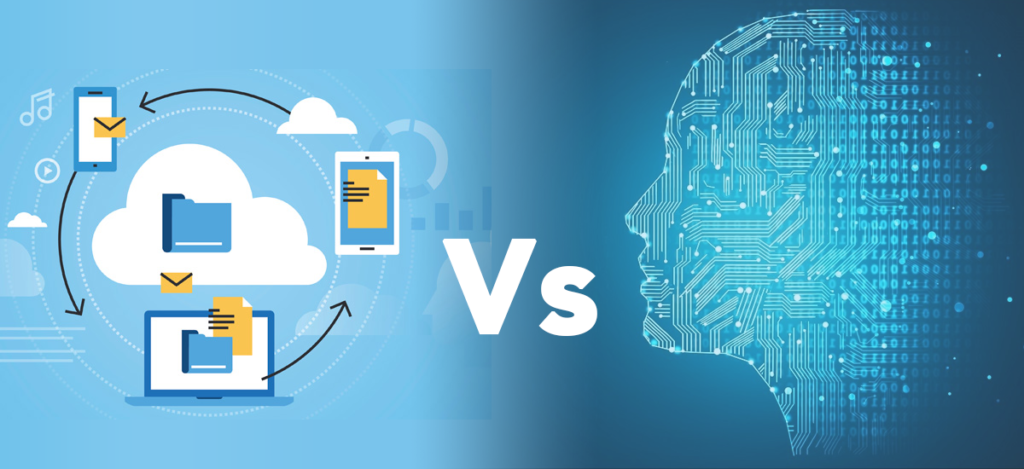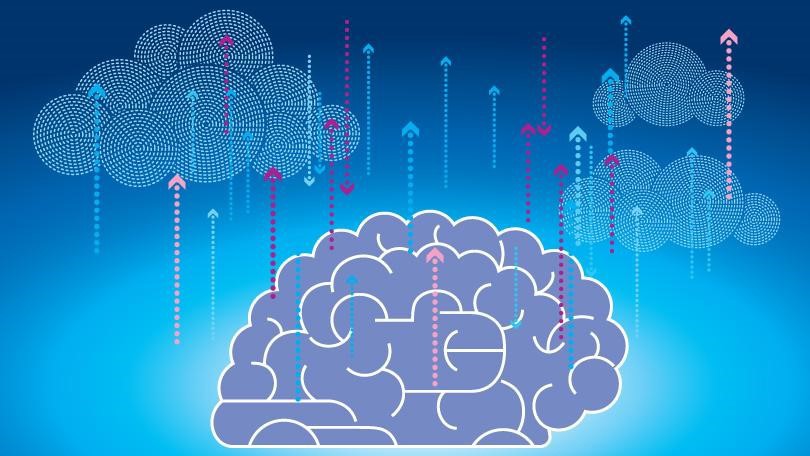How Can We Increase the Benefits Of Cloud Computing By Using Artificial Intelligence?
If we have to identify one thing that is constant in the world of information technology, then surely we will nominate change. This term is the only thing that stayed the same over the decades and is likely to remain in this state in the future. Why do we say this? Because, every other day we see, hear or read about something new happening in the IT industry (you would if you’re a tech geek like me). The case of AI and cloud computing is not much different either. Cloud gradually took over and now we are pondering about increasing its benefits via artificial intelligence. There are many ways to increase the effectiveness of cloud computing and reap more benefits, but before we delve into the details, let’s talk basics.
I know, reading about the basics may annoy you sometimes but consider it a quick recap if you know what cloud computing and AI are, and if you don’t consider yourself lucky because you’re about to enter a new realm of technology that will take over the digital world in the coming years. And don’t confuse yourself, because it has already started. If it hadn’t, you might still be reading about what is BIG DATA and how to store it in a secure manner. Without further ado, let’s get down to business.
What is cloud computing?
Simply put, it is a type of computing which is functions on shared computing resources instead of relying on personal devices or local servers to manage applications. When an organization moves its services outside its firewall, it can be referred to as cloud services. The services may include but are not limited to web applications, storage, data or any other thing that can be accessed through the web.
Cloud-based services are delivered over the internet and the company that needs such services either has to pay as per their need or opt for pay-per-use strategy. Cloud computing is the ability to store and access data, applications and other features to perform different tasks using the internet. Cloud computing has made computing power and data storage solutions available via the internet and these services can be obtained by any individual or company that might need them.
The best part about moving your company’s IT infrastructure to cloud is that you can access it anywhere, anytime using any device with an internet connection and a web browser. Since cloud-based services have made it easier to become more efficient and secure, therefore many organizations around the world are using cloud-based services and platforms. Perhaps, this was one of the main reasons why many tech giants have started offering cloud-based services through their respective platforms including Microsoft and Amazon.
Having explained what cloud computing is and the fact that more and more businesses are moving to the cloud, one must ask what are the benefits of cloud computing? Shouldn’t your in-house IT infrastructure be more secure, safe, and reliable?
The simplest answer is no! The world now runs on Big Data, as companies are not only collecting more and more information but also storing it and processing it to set their future direction. The more data you have, the bigger the infrastructure you would need. And certainly, it comes at a cost that may slow down your other business functions that may need more investment. So cloud computing other than being a cost-effective solution also offers the following benefits:
- Agility
- Practicality
- Accessibility
- No extra maintenance/management cost
- Cost-effective
What are the benefits of cloud computing for business?
Since this article intends to explore how can we increase the benefits of cloud computing via artificial intelligence (AI), thus we think we need to list down a few really important benefits of cloud computing for businesses.
Value for money
A company doesn’t have to invest in IT infrastructure development, maintenance, and management and can scale up as and when needed, thus one can simply say cloud computing offers excellent value for money. Moreover, moving to a cloud with a reliable cloud services provider means that your business or whatever data or application you moved to the cloud will not experience any downtime.
Finally, even if you have deep pockets and can invest in all the things mentioned above, think of the recurring cost of electricity that you might have to pay. There’s a reason why businesses are moving to the cloud and want to know how AI can increase their benefits.
Scale-up as per your need
With cloud-based services, if your business is growing rapidly and you need more space, say, for data storage, then it can be easily procured. On the contrary, if you have a physical setup, then scaling up would become a time taking the process and don’t forget to take into account the money you need to pump in to make it happen.
Moreover, cloud computing has the ability to offer the right amount of IT resources as and when needed including bandwidth, storage, and computing power regardless of the geographic origin of your business.
Efficiency
In today’s environment, where businesses need to be efficient in order to survive and stay profitable – cloud computing offers just that. It eliminates the need for various IT equipment, IT professionals, and time you would need to keep your services up and running.
Secondly, with a single data center, you would reap benefits like reduced network latency for application and more scalability.
Safety
In this digital world, the most important thing is data safety and security. Cloud computing makes your operations, processes, data, applications, and other digital assets more safe and secure by eliminating the most common types of cyber threats. Being safe means that customers will trust your services more.
What is AI?
The term artificial intelligence or AI refers to the area of computer science, which deals with the creation of intelligent machines that can work and act like humans or better. You may have seen The Terminator, a sci-fi film directed by James Cameron. Well, that was one of the early movies that exposed the world to the idea of intelligent machines. That’s not entirely true, at least not at the moment. We are still in the phase of developing intelligent machines and progressing slowly. But the movie reference should give you the idea that artificial intelligence means creating intelligent machines that can think, act, and react like humans or outperform them in certain areas. For businesses, in particular, the interest in AI is developed after realizing data analysis can be performed better and efficiently if AI tools and techniques are utilized properly. This can add great value to businesses, especially the early adopters. This is why companies are interested in exploring how AI can increase the benefits of cloud computing.
Why AI vs. cloud is an obsolete discussion?
There is no such thing as AI vs. cloud. If we look at the evolution of cloud computing, then it can be divided into four phases. In the first phase, cloud computing benefited developers by delivering Platform as a Service (PaaS) to them. In this phase, we saw the birth of many platforms including Azure, Google App Engine, Heroku and others.
In the second phase of evolution, Infrastructure as a Service (IaaS) emerged as the next big thing in the cloud. Data took the center stage during the third phase of cloud evolution and cloud providers started offering a huge range of data platform services.
The fourth phase is the integration of AI into the cloud. In simple words, AI vs. cloud does not exist because cloud providers are gearing to offer AI as a Service in this phase.
Simply put, since AI and cloud can coexist and together they can benefit businesses across the world greatly, there is no reason to discuss AI vs. cloud. Thus, it turned into an obsolete discussion and a thing of the past. In the coming days, it is not wrong to claim that AI and cloud will merge.
Why should we merge AI and cloud?
If recently published studies are to be believed, one can confidently claim that AI has become very important for the strategy and success of many organizations around the globe. Since businesses are already using cloud-based services and now wish to integrate AI in their business model as well, one must explore what will happen if the two concepts become one? Plainly speaking, it will create an explosive growth force. Companies that combine the two will grow rapidly. The servers on which the cloud technology relies are many and hold data that AI can utilize to learn new things, make decisions, and have a conversation. Cloud-based solutions are being used for data storage and thus merging the two technologies would benefit businesses greatly, as they can easily identify the trends of their clients/customers and can act accordingly.
Secondly, machines need data to learn new things and cloud-based storage solutions are the best source to get data in abundance. Therefore, it wouldn’t be wrong to assume that without access to Big Data, machines cannot learn new things. Moreover, the cloud provides great computational power that is required to process Big Data and make intelligent decisions.
How to merge AI and cloud?
The “why” may have underscored the importance of the merger of AI with the cloud. But the question remains how do we do it? How can AI be merged with the cloud? Since AI requires a lot of computational power, which is being offered by the public cloud thus cloud is the ideal place to build AI applications. The merger is something that is inevitable if we need to progress in the field of AI, otherwise, we will only be restricting ourselves to a few specific data analysis functions and would continue to label them as AI.
The merger of AI with cloud computing would basically create a network that will have the capability to store, process, and analyze a huge amount of data and the capacity to learn and progress on the go. Google’s Cloud Machine Learning, Amazon’s Alexa and IBM’s Watson represent how AI when combined with cloud should work. IBM is leading the way by incorporating a deep learning framework, but Google’s Cloud Machine Learning is still far more accurate.
Moreover, the abundance of data on the public cloud also makes it an ideal place to build AI applications. The merger would occur automatically since it is recommended that AI applications should be built on the public cloud. The tech giants are already aiming for developing innovative AI applications that businesses can use to increase their efficiency, productivity, performance, and decision-making abilities. This is the reason why Google, Amazon, Microsoft, and IBM are driving traffic towards their public cloud infrastructure. For tech giants, more data means smarter machines. IBM’s Watson has already registered itself as a great AI application.
Moreover, companies are investing more in the development of AI applications on the public cloud, which is a testament that AI is going to disrupt the market soon.
Benefits of merging Cloud Computing and AI
The possibilities are endless if we merge AI with cloud and so are the benefits. All the benefits we have mentioned above for businesses including data/information security, enhanced performance, improved productivity, practicality, and accessibility will increase manifold.
Apart from benefits to businesses, merging AI with cloud can enhance the capability of facial recognition software that would ultimately improve security, translation of documents into various languages can be done more accurately without human input, customer service can be automated to ensure customer satisfaction, and unimaginable amounts of data can be analyzed quickly and decisions can be taken promptly. AI after analyzing the data can give various options for a business to take. As mentioned above, the benefits of merging the two technologies are practically endless and we as of now are unaware of its full potential. Things we know today might change completely. Don’t forget The Terminator.
Machines can only learn new things and become smarter and intelligent if the merger between cloud computing and AI happens smoothly. The merger can turn these deep learning potentials into a reality. The cloud servers located in different countries around the world store data and information about every country, every race, every ethnicity, every behavioral trait, and every purchase we made. If AI gets access to these servers and this huge amount of data, then it can make informed decisions. Moreover, AI will not only decode the patterns and make sense of raw data but will also add this new information to the cloud, which can also assist other AIs in learning as well.
The reliance of some organizations to fight cybercrime on IBM’s Watson is actually helping Watson learn how to fight cybercrimes, what are the indicators, and what to do if cybercriminals get their hands on sensitive information. Watson is become more intelligent with each passing day, as it is learning new things and storing/processing more information.
However, AIs that have access to the cloud is still not as effective and accurate as they are supposed to be. Watson still makes mistakes and human intervention is necessary for several instances. AI is evolving and it will take time to multiply the benefits of the cloud and offer more. But as of now, AI can still help businesses get a basic, rational understanding of the risks they may face in the future.
AI is being integrated into business processes already and top management of various large organizations acknowledge the fact that AI is integral for their survival and success.
Disadvantages of using either of them without another
To make a point, think of it this way. How far can a vehicle go without fuel? Data can make AIs smarter and as of now, the public cloud is the best source to collect data. From making the discussion of AI vs. cloud obsolete, we have come a long way. Now, we are at a point where it wouldn’t be wrong to claim that machines cannot become intelligent without data.
If we use the cloud without AI, then its potential will not go beyond a certain point. I think the public cloud has already reached that point. AI, if used without the cloud, will make inaccurate predictions and can never be considered intelligent. For machines to become truly intelligent, they need access to a huge amount of data, which is only available on a public cloud.
Conclusion
Coming back to the question, AI thrives on data and cloud is the best source for it. So if we truly desire to increase the benefits of cloud computing for businesses and the general public, then we must work on merging it with artificial intelligence. However, we must remain cautious and should always take into account what would happen if machines become smarter than humans. Don’t forget all the sci-fi movies that have warned us about the dangers of making machines smarter than humans.
Also, Read AWS Vs. Azure Vs. Google Cloud – Which Provides The Best Cloud Services








